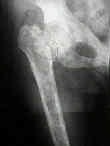- Discussion:

- metastatic breast disease survival averages 34 months;
- avg life expectancy w/ metastatic disease to bone is > 18 months;
- Radiographs:
- permeative destructive lesions of bone;
- permeative destruction of the proximal femur is the most common type of destruction leading to a pathologic fracture;
- look for subtle changes of bony destruction;
- permeative destruction of bone is most likely due to metastatic deposits of breast cancer;
- Labs:
- need to rule out hypercalcemia;
- Biopsy:
- because disuse osteoporosis may show similar appearance, the x-ray diagnosis
should be confirmed w/ biopsy, unless the diagnosis has already been confirmed;
- Medical Management:
- estrogens & antiestrogens:
- cause hypercalcemia in approx 30% of pts when used to treat breast cancer, which is metastatic to the skeleton;
- bisphosphonates:
- pamidronate
- Surgical Fixation:
- permeative destruction of the proximal femur is the most common type of destruction leading to a pathologic fracture;
- for pts w/ this type of destruction involving more than 50% of the shaft diameter on any radiographic view, consider prophylactic
internal fixation of femoral neck & subtrochanteric region;
- see: technique of femoral IM nailing:
- wide resection of solitary mets;
- in the retrospective study by Dürr HR, et al, the authors studied the effect of wide resection on solitary breast ca mets;
- of the six patients with radically resected solitary bone lesions, five patients had systemic progression of the disease develop;
- for the entire group, the survival rate was 59% after 1 year, 36% after 2 years, 13% after 5 years, and 7% after 10 years;
- independent factors that were associated with survival were the extent of the disease and the duration of symptoms from bone metastasis;
- the authors noted that wide resection of solitary mets did not improve survival and that patients with solitary bone lesions have a 39% chance of living 5 years
The pattern of vertebral involvement in metastatic vertebral breast cancer.
Human breast cancer: survival from first metastasis. Breast Cancer Study Group.
Surgical Treatment of Bone Metastases in Patients With Breast Cancer

